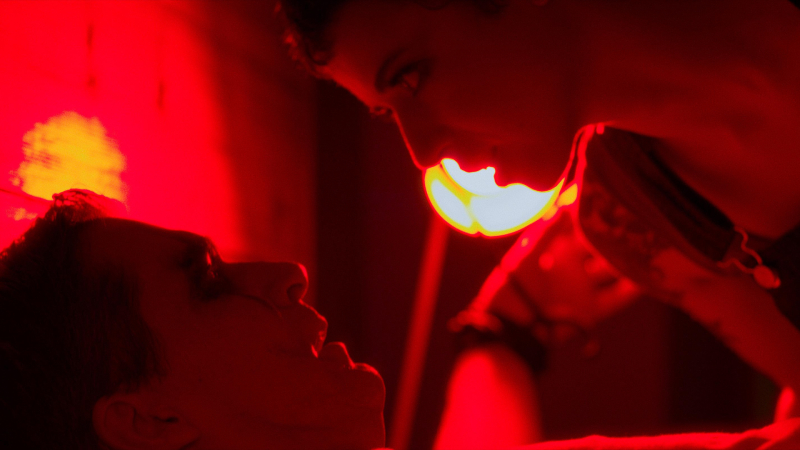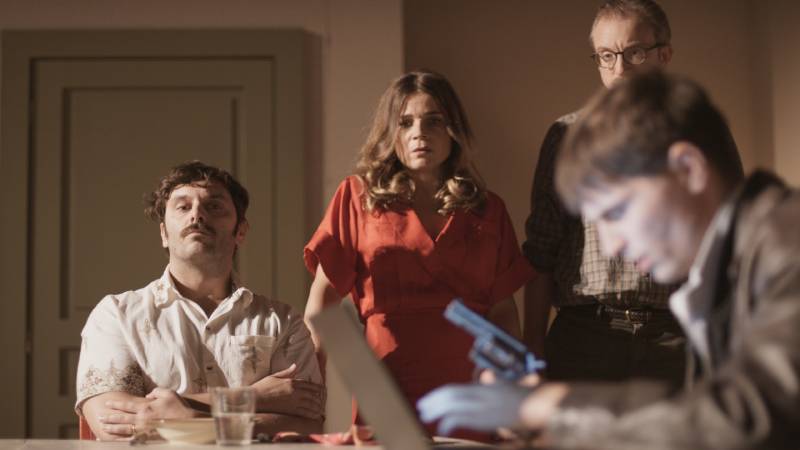Another year has gone by and DMovies is now nearly eight years old. Since we started in February 2016, we have published more than 2,900 exclusive articles and reviews. We have attended both big and small film festivals and industry events of Europe, always digging the dirty gems of cinema firsthand and exclusively for you.
We physically five a-list festivals across Europe: Berlin, Locarno, Cannes, San Sebastian and Tallinn. Other gigs included the Turin, REC Tarragona, Transylvania and the Red Sea Film Festival, in Saudi Arabia, plus the usual suspects across the UK (the BFI London Film Festival and our indie favourite Raindance). We have published in excess of 400 articles and reviews and renewed our biggest partnerships.
We decided to pull together a little list of the 10 dirtiest films of 2022. And what better way to do it than asking our most prolific writers and also our audience for their dirty pick of the year? This is a truly diverse and international list, containing very different films from every corner of the planet, some big, some small, some you can still catch in cinemas, some on VoD and some you will just have to keep an eye for, at least for now!
Don’t forget to click on the film title in order to accede to the our dirty review of the movie (not necessarily written by the same person who picked it as their dirty film of the year). The movies are listed alphabetically…
,,,
.
1. All of Us Strangers (Andrew Haigh):
Chosen by Daniel Theophanous
Loosely based on the 1987 novel Strangers by Taichi Yamada, All of Us Strangers is the story of Adam, in his 40s, a scriptwriter living a lonely existence working and living at home with an inability to connect with others. His life is marked by the tragic death of his parents, killed in a car accident just before his 12th birthday. The day after his encounter with Harry, in an elaborate trip down memory lane he makes his way to his suburban childhood home in Croydon. Finding himself at his local park, a place which initially gives the impression of a cruising spot, enhanced by the presence of an attractive moustached man in a leather jacket signalling him into the bushes. Adam follows him into an unexpected opening and upon close inspection it is revealed the man is his dad, looking just like before he died. A subtle and playful use of a gay trope nods to Haigh’s signature understated directorial approach.
.
2. Asteroid City (Wes Anderson):
Chosen by Anton Bittel
It may come with Anderson’s typical whimsy and familiar cartoonish stylisations, but this formally challenging, hermeneutically convoluted work is focused on a deep, deep grief that no amount of narrative embedding can truly, permanently bury. Anderson’s retro-futurist small-town ’50s setting, the picture-book production design and dead-on cinematography, all the overt artifice and metatheatrical play, and even a story involving a visiting alien (and an incursion of Brechtian alienation effects) cannot quite contain the sense of loss that his eccentric ensemble of characters struggles to suppress as they look away from the grave towards the heavens – and so Asteroid Cityproves a richly layered, constantly diverting study in melancholy. It is beautiful, funny, sad, wise and humane.
.
Chosen by readership (most read review of the year)
Never before in your life have you seen as much pink. Costumes, houses, cars, streets and even the sky. Your eyes might suffer inflammation or photophobia. You might become pink-blind. This is a luminescent movie that exudes not just colour, flair and vigour, but also some very bright and gleaming messages. At a duration of nearly two hours, Greta Gerwig’s third feature film (after 2018’s Lady Bird and 2020’s Little Women) is her most expensive and commercial one, but this does not mean that the 39-year-old director has waived her auteurial sensibilities, her audacity, and her ability to touch and move even the most cynical and hardened of hearts..
.
4. The Eight Mountains (Felix Van Groeningen, Charlotte Vandermeersch):
Chosen by John McDonald
Belgian filmmaker Felix van Groeningen, known for the heart-breaking 2019 film Beautiful Boy , is joined by his actress wife Charlotte Vandermeersch for this latest project, an adaptation of the award-winning 2016 novel of the same name by Italian author Paolo Cognetti. It’s a film that has been described as a “straight Brokeback Mountain (Ang Lee, 2005)” which kind of says a lot about it – but this is far from being just a one-dimensional retelling. It explores a simple friendship with complicated edges, a combination of two isolated souls in dire need of this concept, and how it can cultivate into something significant and extremely poignant over time.
.
Chosen by Jeremy Clarke
A single mum with two young kids struggles to hold her working life together in a Paris where the transport network in and out of the city is paralysed by strikes. The brief moment of calm at the start of the movie gives little indication of the relentless nature of what is to follow. Julie Roy (Laure Calamy) sleeps deeply, a figure at rest, as we watch parts of her face in close-ups. Suddenly, this tranquillity is shattered by the aural violation of the quiet by an alarm clock. As she gets the kids up, the radio blares out something about an increase in working hours and something else about the welfare state. The impression is of the microcosm of her life and the macrocosm of the wider world (France) in a state of crisis. She bundles her kids off to the child-minder’s and boards a pre-dawn train to Paris. The train is terminated because of an unwell passenger, so she has to switch to a bus to get to St. Lazare, and as she is trying to get to The Churchill, the luxury hotel where she works as a head chambermaid, she must fend off a mobile phone call about her mortgage repayments.
.
6. Faceless After Dark (Raymond Wood):
Chosen by Paul Risker
This is a damn fine genre picture. Responses to the toxicity of social media have revealed that it’s a trickery little devil – concealing its true meaning. One suspects society might be terrified if it knew what an honest exploration the film is of a common, but ignored and misunderstood rage bubbling beneath the surface all around us – in part, how we create our own monsters. All of this is presented with subtlety. Director Raymond Wood, writers Todd Jacobs and Jenna Kanell, who plays the lead character, Bowie, ensure that first and foremost it’s a rollicking good genre picture with plenty of carnage and blood. And, in a time when references and influences aren’t discreet, here, the unhinged artist delicately evokes the spirit of a famous ‘fallen’ female character of 1950s cinema.

.
7. Falling into Place (Aylin Tezel):
Chosen by Eoghan Lyng
A German lady and a Scottish man live out their memories on the streets of London, in this highly accomplished German film. Falling into Place avoids the most everyday clichés to demonstrate a love story based on guilt and unfulfilled desire. The audience knows more about the characters than they do, which might explain why they spend so much of the film apart. When Kira returns to London, she catches up with her Irish ex-boyfriend, hoping to rekindle the memories they shared. She’s open and honest in all the ways Ian – a struggling musician desperate to catch a break – is not. His seclusion likely stems from his father’s ill health – not forgetting his sister, who is situated in a hospital to cure her manic depression. They find other loves, but none of their partners seem to reignite the spark they enjoyed on that cold night in Skye. The question remains: Is it better to confine love to memory, or should you break free from the shackles of convention, and “take a risk”?
.
8. In the Rearview (Maciek Hamela):
Chosen by Louis Roberts
Premiering at Sheffield DocFest last week, where it went on to win the Grand Jury Award in the International Competition, In the Rearview is a co-production of Ukraine, France and Hamela’s native Poland. Set almost entirely in the filmmaker’s own minibus as he takes thousands of refugees to safety, the film’s intimate yet non-intrusive approach is the very definition of ‘less is more’. Despite the extraordinary circumstances in which its subjects find themselves, the film is incredibly effective as a slice-of-life documentary, a testament to the resilience and courage of the normal people this conflict has affected, as well as Hamela’s determination to tell their stories as truthfully as possible.
.
9. Killers of the Flower Moon (Martin Scorsese):
Chosen by Victoria Luxford
After nearly 60 years of filmmaking, Martin Scorsese is still capable of making films that keep you glued to your seat. Teaming up with regular collaborators Leonardo DiCaprio and Robert DeNiro, Killers of The Flower Moon is both a complex power struggle and a howl of rage from America’s ugly past. Lily Gladstone is the heart and soul of the piece, with DiCaprio as ever excelling as a man torn between light and dark. At 81, there are more films behind the Oscar-winner than ahead, but he shows no sign of slowing with one of the most gripping films of the year.
.
10. The Zone of Interest (Jonathan Glazer):
Chosen by DMovies’ editor Victor Fraga
Jonathan Glazer’s latest creation hits your head so hard that it keeps it spinning vertiginously. It throws your set of inner values and principles into disarray, and make you question the very nature of your humanity. It’s a necessary and urgent film, relevant to people of all nationalities and with a topic as current as it was 80 years ago, when the Third Reich was at its height.
The movie depicts the routine of Rudolf Hoess (Christian Friedel), the longest-serving commandant of Auschwitz concentration and extermination camp, his wife Hedwig Hensel (Sandra Hueller) and their five children (ranging from babyhood to 11 years of age) around 1943 in a large country house. The facilities are very comfortable, however not particularly extravagant. The dining room and lounge are elegant and spacious, the medium-size garden is populated with gingerly pruned plants, a table and a few chairs. This is where Rudolf welcomes other Nazi officers. A guest casually describes how the gas chambers work, with a factory plant to hand: “load, burn, cool, unload, then start all over again”. It sounds as if they are talking about a food manufacturing procedure. This is also where the children play. Where Rudolf and Hedwig enjoy their intimacy, sharing the friendly banter and occasional joke. A quiet lake nearby provides the family with rural entertainment, reflection and a connection with nature. This could be any German family. It is such casualness that is most jarring. These people lead a hair-raisingly mundane existence.
The Zone of Interest is pictured at the top of this article.
..
And here goes one last-minute addition:
The Beast (Bertrand Bonello):
Chosen by Nick Kouhi
One of contemporary French Cinema’s most exciting provocateurs, Bertrand Bonello has cultivated a knack for confidently melding potentially incongruous genres into a recognizably pervasive strain of dread. His new film The Beast is possibly his boldest work yet, as intellectually rigorous as it is stylistically dazzling in its three historically discrete but thematically linked tales of l’amour fou between a couple spanning across a century and two continents.
The would-be lovers bear the same names in their separate lives: Gabrielle (Léa Seydoux) and Louis (George MacKay), whose paths first cross in early 20th Century Europe. Their chance encounter in Paris sparks a kinship where she confides in him a latent fear of some unknown catastrophe that will befall her. The central premise, inspired by Henry James’ 1903 novella The Beast in the Jungle, extends to 2014 where Gabrielle is now a struggling actress in Los Angeles and Louis is the thinly veiled double of Elliot Rodger, whose misogynist social media vlogs culminated in six murders near the University of California.










